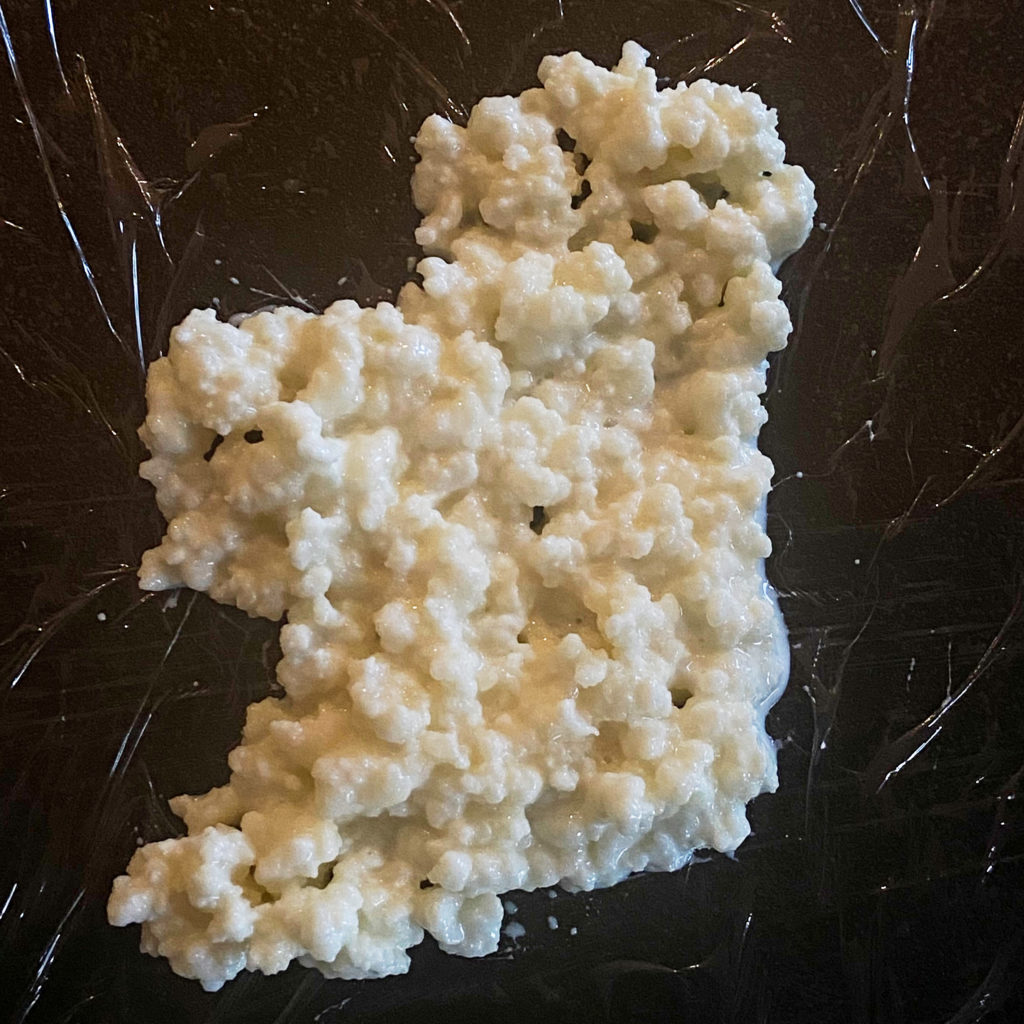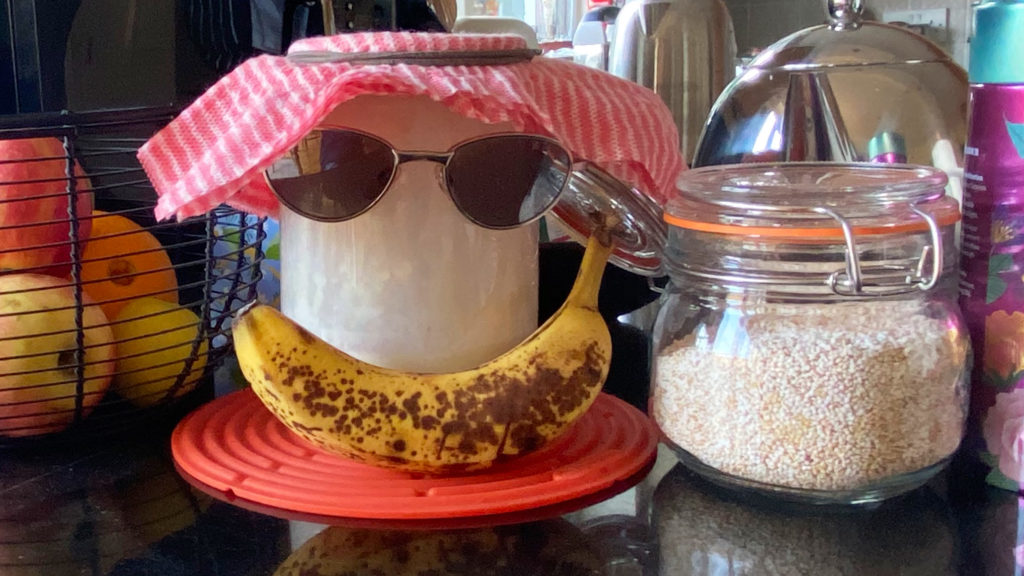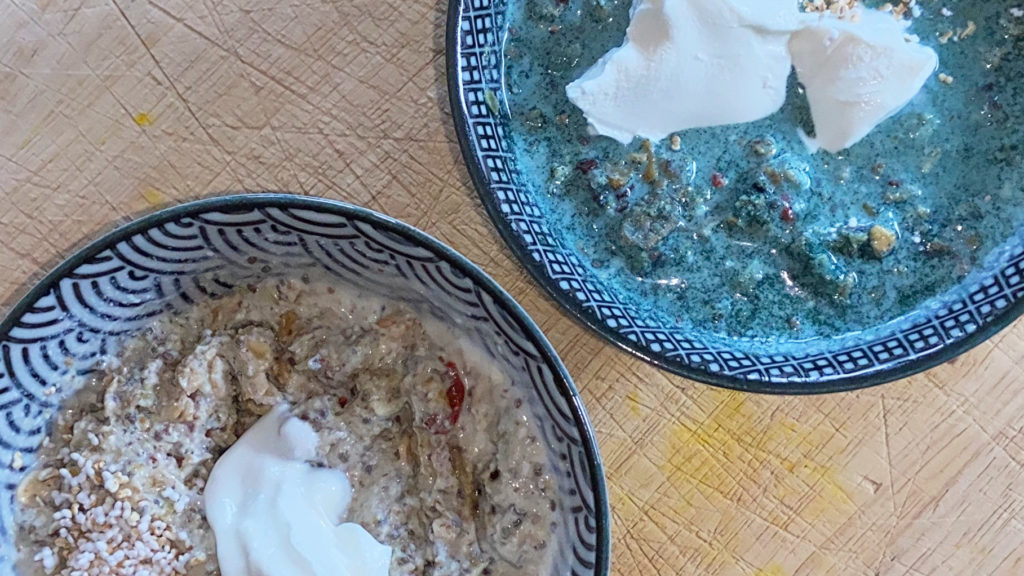We’ve been enjoying our own kefir pretty much every day since a friend gave some grains to Lia. Counter Kefir thrives in the kitchen. We use it exclusively in our morning granola. Hers greened with spirulina, them both riddled with cran-, blue- and goji berries as a health-maintaining minimum of supplements we add. There was a time that we’d buy kefir or other probiotics to use for breakfast but having our own is much more satisfying.

Kefir Grains 
Counter culture at the ready 
Granola for two
So, I wondered, how old is our kefir? How long has it been going? So I asked the donor.
It turns out that this kefir came from a horse trainer in Clare who happens to be the owner and trainer of a horse that our friend bred. The trainer in Clare has an alternative view on nutrition and has been feeding kefir to his horses for a number of years to help prevent ulcers and for overall immune health. Our friend has had the kefir for about three years. The horse trainer had it going on six years. He got it coming from someone who had it for about five years and that they had got it from a Polish or a Russian lady. Shrouded in mystery, who knows how old Counter Kefir really is.
To mention kefir is to enter a world of probiotics leading to talk of home fermentation, possibly a word on the scoby of kombucha and thence perhaps sourdough. Like many, we used to keep a sourdough starter in our fridge. I think we started our first in Houston back in the 80s, used in pancakes for the family or ribbed cylindrical breads baked in large orange juice tins. Several attempts over the years have ended up in the bin by accident or because of fear. Our last ten year old sourdough was found in our fridge while we were in living in London. Mistaken for a deadly horror, something overlooked for years, an indictment of our fridge hygiene, an oversight not to be mentioned to avoid embarrassing parents, it was put down (the sink). It seems that medical decontamination protocols were invoked just to be sure.
My brother and his family run the Chalk Hills Bakery in Surrey. They started the business with a Polish baker who brought a sourdough via South Africa. Their descendant Surrey sourdough has been going for over ten years. And the Polish partner eventually moved to Queensland where the sourdough drives yet another bakery. Good sourdough is persistent.
I emailed friends in Texas about another sourdough story that I’ve liked to relate, wanting them to refresh my memory of their story. And this was the prompt and enthusiastic reply:
‘In 1991, my grandfather, Ezra Schaibly, handed down a batch of sourdough starter to me from his Sourdough Pot. The origins of his Sourdough Pot trace back to California in the early 1910s. Thus, when I received that sourdough, it was approximately 80 years ‘old’. For the past 29 years, I’ve been making sourdough pancakes for family and friends, and on occasion, passing on a bit of sourdough starter so another family could start their very own Sourdough Pot. The current age of the sourdough is about 109 years.’
I also know that one bit of their sourdough ended up in London, shared with a mutual friend. I emailed London and heard back equally promptly:
‘The Ezra sourdough starter is also fit and well. It coughs carbon dioxide on occasion, but that’s what it’s supposed to do … X poured all mine down the sink about 6 months ago, but I resurrected a friend’s Ezra and began again.’
Ezra. I hadn’t realised that this sourdough has earned a name. And fortunately, the ‘bit’ of Ezra in London had been further shared, forward thinking perhaps, so that disaster recovery was possible.
And then there’s the story of a screamingly hot kasundi chutney that we devoured with Gubeen cheese and Yalumba Galway Pipe tawny port when it wasn’t spicing up our soups. It came to us in Dublin, a home-made gift from the friends in London with whom we polished off that port and cheese, the particular batch having been influenced by the tastes, skills and experiences of Ugandan family recipe custodians. Though not ‘alive’ like sourdough or kefir, it lasted almost two years in our fridge, that strong that only a teaspoon was required to flavour any meal for the entire family.
Maybe I deny an autonomous life to culture by referring to the kefir as ‘ours’, the sourdough as ‘theirs’. If kefir and sourdough last for generations, perhaps we are theirs, custodians outlasted by culture. Yes, I like the involuted idea that an edible counter culture that sustains us can also survive us.

I’ve never tried kefir but I feel a connection with this post because I put spirulina in a green smoothie that I made this morning, and I really like Yalumba Galway Pipe port. Maybe the good of the spirulina will cancel out the bad of the alcohol (fingers crossed!)